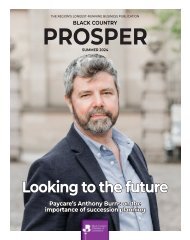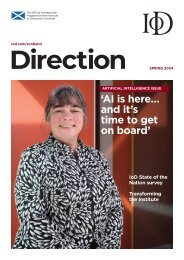IoD Scotland Autumn 2021
Institute of Directors Scotland, business magazine, directors
Institute of Directors Scotland, business magazine, directors
You also want an ePaper? Increase the reach of your titles
YUMPU automatically turns print PDFs into web optimized ePapers that Google loves.
Leadership Interview: Professor Mark Logan<br />
Continued from page 13<br />
To prove his point, he offers a lesson<br />
from history. “I’m from Clydebank. At<br />
one point a fifth of the world’s ships<br />
came from its shipyards; Clydebank<br />
built over 30,000 ships. An entire<br />
infrastructure was created around the<br />
area to support the shipyards. New<br />
businesses were set up to feed through<br />
what was needed – parts, services,<br />
people – and in the end these shipyards<br />
came to dominate the world of shipping.<br />
“Think of it in today’s language:<br />
Clydebank was a hi-tech start-up<br />
ecosystem. The only difference was that<br />
the raw material of that ecosystem was<br />
iron rather than software. Why can’t we<br />
repeat that?<br />
“<strong>Scotland</strong> is a start-up nation, always<br />
has been. We can turn our hand to<br />
anything as long as we have the right<br />
ecosystem in place to support it.”<br />
Creating such a system is a mammoth<br />
– but achievable – goal, and one that will<br />
be based on education. “The tech sector<br />
needs a pipeline of new talent. There<br />
are many things you need to create the<br />
perfect digital ecosystem but if we are to<br />
make <strong>Scotland</strong> a world leader in tech, it’s<br />
people with the right skills that we need<br />
first.”<br />
This starts with the schools and<br />
colleges. Young people need coding<br />
skills, says Mark, but he’s concerned that<br />
it’s going to take a huge sea-change in<br />
attitude to ensure this happens.<br />
“I’d say that we are facing an<br />
educational emergency. Everything<br />
we have planned for the future is<br />
underpinned by this pipeline of talent<br />
from our schools and colleges. However,<br />
there’s a worrying trend developing: we<br />
have fewer computer science teachers<br />
than a decade ago, fewer children taking<br />
computer science and an even greater<br />
gender imbalance in the subject.<br />
“It’s as if we’re moving away from a<br />
digital future, not towards it.”<br />
“We have to shift mindset. If maths<br />
was collapsing at schools, we would<br />
respond appropriately and put the<br />
necessary resources in, as people would<br />
say that it’s vital children leave school<br />
with good maths skills. I’d say, nowadays,<br />
having good computer science skills was<br />
as critical as good maths.”<br />
A lack of dedicated computer science<br />
teachers is often put down to more<br />
attractive opportunities being available<br />
in industry, but Mark says that this is too<br />
simplistic a view on what is happening.<br />
“Why not offer teachers in other<br />
disciplines the computer science skills<br />
we need? If you have a good maths or<br />
science teacher, you can give them the<br />
skills they need to teach computing. Or<br />
we can market more actively to science<br />
and engineering undergraduates about<br />
computing science teaching. We don’t<br />
do that. Let’s behave as if solving this<br />
problem greatly matters.”<br />
Mark feels that computer science is<br />
often sidelined in schools. “We need to<br />
make the syllabus exciting and dynamic,<br />
so we attract the brightest students<br />
and the best teachers. At the moment<br />
we have weakened the subject to<br />
accommodate teaching by non-sector<br />
specialists. Imagine if we did that to<br />
maths – made it easier, so non-maths<br />
teachers could teach it. We just wouldn’t<br />
tolerate that.”<br />
<strong>Scotland</strong> must look outside its borders<br />
to see how other countries teach<br />
technology. “If you look at Estonia, for<br />
example, they’ve done this really well.<br />
If you think it is important, you make it<br />
important. Until now, we haven’t.”<br />
Among many ideas to improve this<br />
situation, he has one simple idea which<br />
is straight from Silicon Valley: “Silicon<br />
Valley flourished by creating a pool of<br />
shared knowledge and excellence, a<br />
place where people could learn from and<br />
teach others. Do the same with teaching.<br />
Set up a learning network for computer<br />
science teachers, dedicating some of<br />
them to curating and propagating best<br />
teaching practice across the country,<br />
and hold an annual conference to further<br />
build identify and community.”<br />
Creating a pathway to develop skills<br />
would help, too. “Computing changes<br />
far more quickly than every other<br />
subject. For a teacher graduating 13<br />
years ago, there was no mobile app<br />
development, for example. We need a<br />
micro-credentialised MSc and similar<br />
schemes for teachers to take over a<br />
period of time, allowing them to master<br />
the subject and then remain current.”<br />
But improving computer science<br />
in schools isn’t the only requirement.<br />
“We need more opportunities for<br />
older people to learn coding and other<br />
computing skills. There are plenty of<br />
talented people out there who possibly<br />
left school without the chance to gain<br />
tech skills but who would love to learn<br />
them now.”<br />
We also need to help our computing<br />
graduates. “Great, they’ve got the<br />
technological skills, but let’s help them<br />
gain the entrepreneurial skills they’ll need<br />
if they are to join or lead a start-up.”<br />
Access to funding is crucial too, but<br />
his main challenge is for <strong>Scotland</strong> “to be<br />
bold if it is to fulfill its vision of being a<br />
tech leader. We need to create space for<br />
start-ups in incubator units, where they<br />
can nurture new ideas. We need to see<br />
the cross-fertilisation of ideas, where<br />
companies are learning from each other<br />
via a network of tech hubs.”<br />
But <strong>Scotland</strong> also needs to import<br />
best practice. At Skyscanner, “we knew<br />
14 iod.com <strong>Autumn</strong> <strong>2021</strong>

















